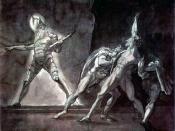Hamlet is introduced to the play in act one. Amongst the eerie atmosphere of tension and unease the fact that he does not actually speak until scene two stimulates intrigue about his character in the audience. Hamlet's first soliloquy gives us a first glimpse of his inner thoughts, and helps us to understand his character better. The speech is particularly important to the audience because Hamlet conceals his true feelings from the other characters around him. Also in act one we see Polonius and Laertes' obvious dislike for Hamlet. As close friends of Claudius, they do not trust him, and warn Ophelia away from meeting with him.
Scene one takes place in an atmosphere of tension. The characters are edgy and uneasy with one another. They speak in short, abrupt sentences without an explanation as to why they are so nervous. Very early in the scene there are references to death and decay, which later becomes a central theme of the play.
The ghost of King Hamlet creates further apprehension since something about his death has prevented his resting in peace. Horatio sees the ghost as a bad omen for the whole country of Denmark, which is itself poised on the brink of invasion from Norway. Hamlet is referred to for the first time at the end of scene one, which further builds tension, since the audience eagerly await his reaction to the ghost's appearance.
Scene two opens with a speech from Claudius, and the Court is anxious to hear what their new King has to say. He begins by paying a warm tribute to King Hamlet, which later becomes highly ironic since Claudius killed him. He lies very articulately, which would suggest that he is used to doing so. His purpose in the speech is to explain why...


